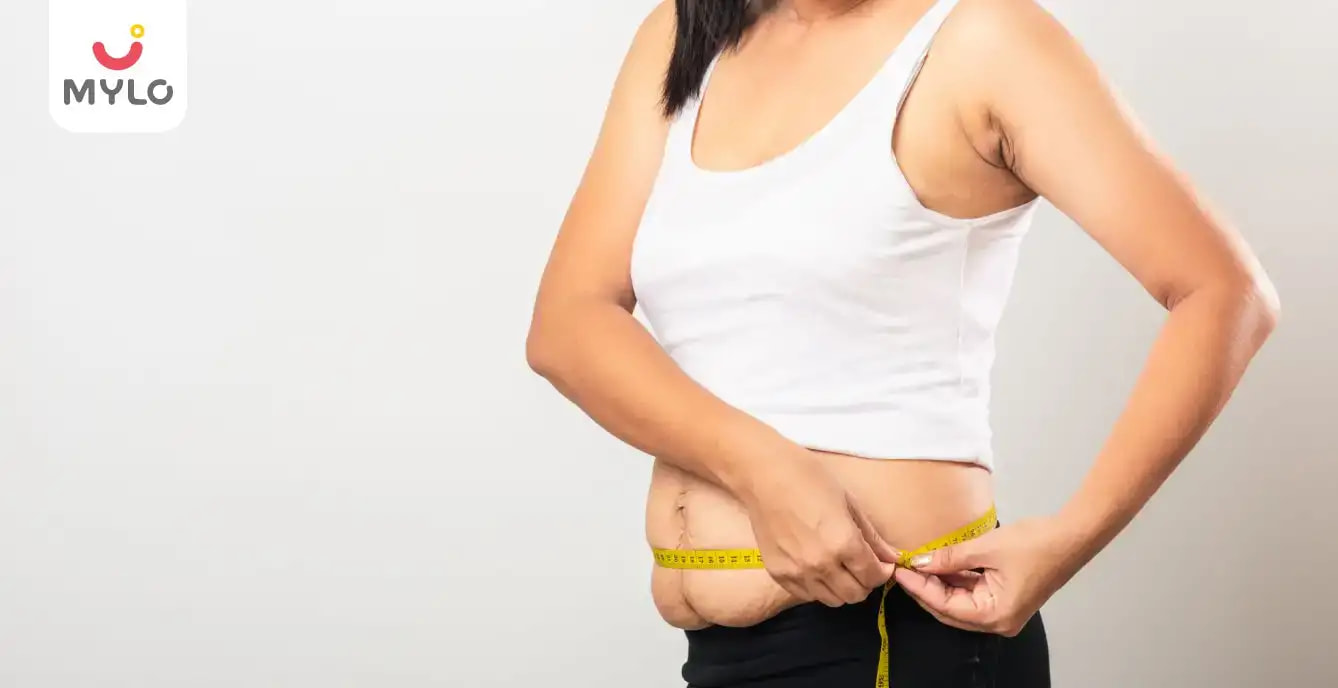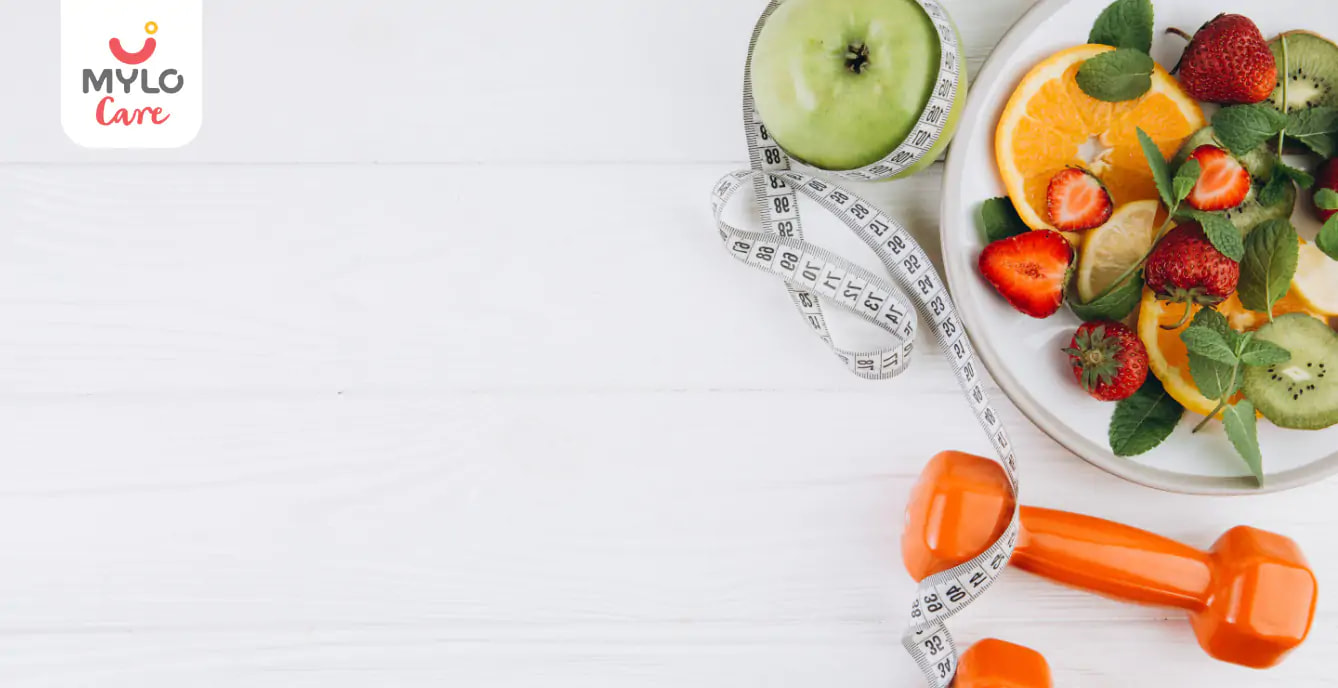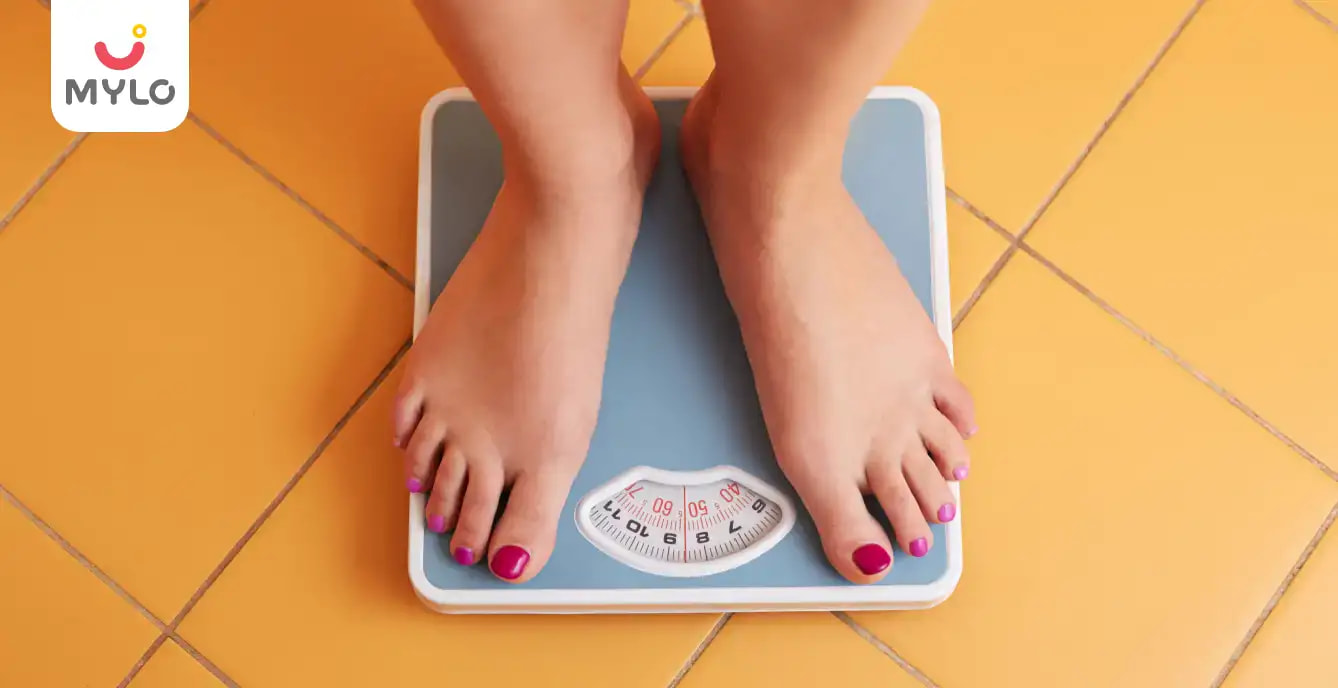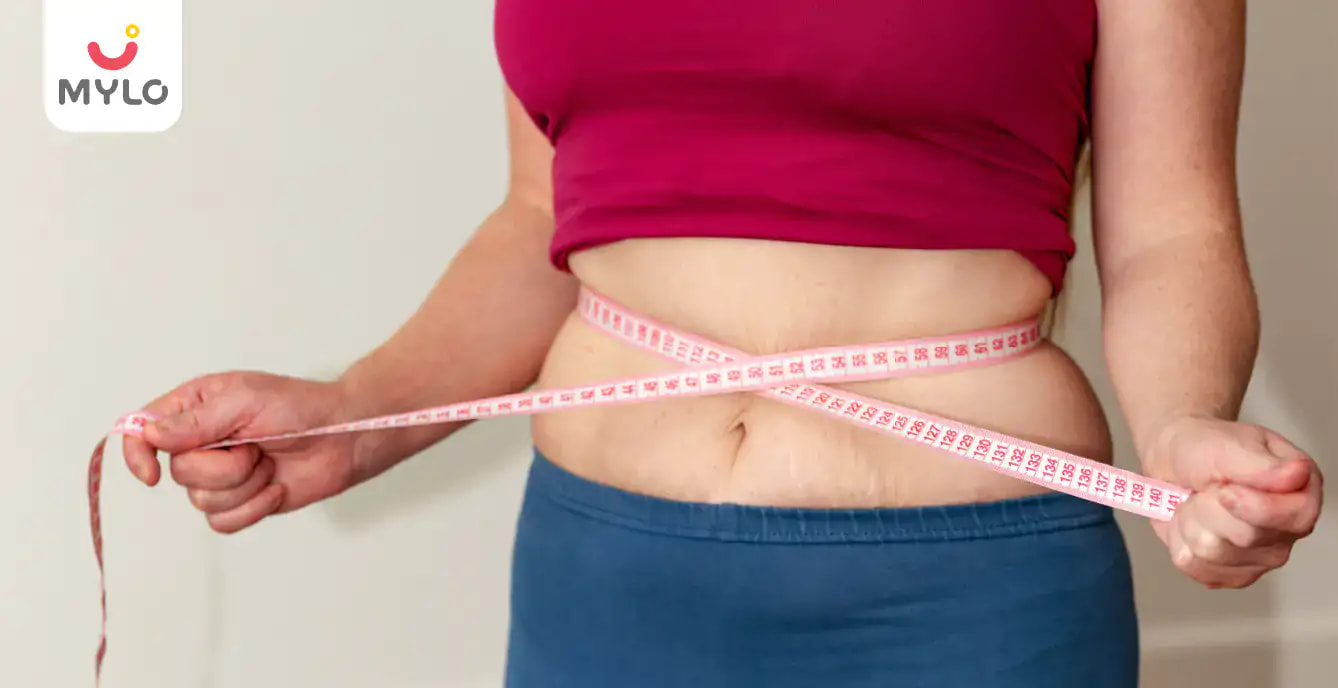Home

Weight Loss

When Is the Best Time to Plan For Postpartum Weight Loss?
In this Article

Weight Loss
When Is the Best Time to Plan For Postpartum Weight Loss?
Updated on 3 November 2023
Pregnancy is a beautiful journey, but it often brings along some unwanted weight gain. New mothers often struggle to lose the extra kilos they gained during pregnancy. It can be frustrating and overwhelming to manage the new responsibilities of a baby while also trying to lose weight. This article will provide a comprehensive guide on postpartum weight loss and help new mothers regain their confidence and health.
What is baby or postpartum weight?
During pregnancy, healthy women gain weight in the range of 10 to 16 kg. Underweight women, overweight women, and those carrying multiple babies have different weight gain recommendations. Your doctor may also have additional advice based on your own needs.
According to various studies, gestation weight gain consists of the baby, placenta, amniotic fluid, breast tissue, blood, and excess fat. The extra fat acts as an energy reserve for giving birth and breastfeeding. However, excess weight gain during pregnancy is generally referred to as baby weight. It is common among pregnant women.
According to the research, nearly 50 percent of pregnant women gain more weight than proposed. The outcomes of extra weight after delivery include:
- High risk of being overweight
- Greater risk of being diabetic and heart disease
- Increased health threats for women with gestational diabetes.
How much weight do you lose after giving birth?
Whether it's a normal delivery or a C-section, most women lose about 6 kg after delivery. Most of the weight comes from the baby, who may weigh around 3-4 kg. The remaining weight comes from delivering the placenta and the loss of amniotic fluid that surrounds your baby during pregnancy. You may lose a few pounds the week following pregnancy as you flush retained fluids.
The excess weight from the fat stored which you gained through pregnancy won't disappear so shortly. After giving birth, your body will feel different even if you are close to your pre-pregnancy weight. Your stomach may appear inflamed and heavy. The uterus takes about 5 to 6 weeks to shrink back down to its pre-pregnancy size.
How long does it take to lose weight after pregnancy?
Experts say that many women who gained recommended weight during pregnancy may be able to shed it and return to their old weight within 6 months to 1 year after giving birth. But that is just an assessment, and everyone's postpartum weight loss timeline is different. Some of them could take about 10 months to 2 years to jump back to their pre-pregnancy weight.
Even though you might have reached your pre-pregnancy weight, your body won't look the same as it did previously. Some women have soft round bellies, hips may be broader, or breasts may be smaller after delivery. It's more than okay since it's fantastic. All these result from the changes you experienced through pregnancy and baby delivery. They deserve to be acknowledged.
Postpartum weight loss timeline
Many women need time to recover after giving birth, which is different for every woman. They should not expect to lose weight quickly and wait until they go for a postpartum check-up. Doctors usually suggest waiting for 12 weeks after giving birth before trying to lose weight.
During the postpartum check-up, a doctor will examine how well the mother and baby are recouping from birth. They will check for any indications of infection, blood clots, or postpartum depression. Weight loss after delivery usually takes several months. But a proper healthy diet and regular physical activity can achieve healthy weight loss.
Tips for postpartum weight loss
Here are a few tips that you can follow to lose weight postpartum:
1. Take good care of yourself
Let yourself have some time to rest and recover after giving birth. Try keeping stress at bay. The weight loss will occur gradually by following healthy lifestyle practices like healthy and mindful eating, adequate rest and sleep, and staying hydrated. Although pregnancy changes our bodies, motherhood changes our lives. Since you're new to this phase, take your time and ask for help whenever needed, either from your friends or family.
2. Breastfeeding
Breastfeeding after giving birth helps to lose weight as calories are required for breastfeeding. Your body burns up to 400 to 500 calories producing breast milk from the fat stored and the food you intake. Breastfeeding also facilitates the release of hormones that enable you to shrink your postpartum belly and uterus.
However, many women eat more than required while breastfeeding, which makes losing the last pounds of baby weight difficult. While trying to breastfeed, avoid starving yourself just because you need to lose weight. It can affect milk production. It can also lead to a lack of energy to take care of the baby.
You may also like: Importance and Benefits of Breastfeeding for Both Mom and Baby
3. Set realistic goals
Losing weight after pregnancy takes time, despite what magazines and movies show. A study previously concluded that 75 percent of women were heavier 1 year after giving birth than before pregnancy. Of these women, around 50 percent were at least 5 kg heavier after 1 year, and 25 percent were 10 kg heavier.
Depending on how much you gained during pregnancy, it would be best to set realistic goals over the next 1 to 2 years. You could ideally lose up to 5 kg in a year. Of course, with a good diet plan and exercise, you should be able to lose weight healthily.
4. Don't crash diet
Crash diets are low-calorie diets that help you lose weight in a shorter period. Your body needs good nutrition to heal and recoup after delivery. If you are breastfeeding exclusively, you need a higher calorie intake.
A low-calorie diet will deprive the body of essential nutrients leaving your body tired. Reducing your calorie intake by about 500 calories per day will promote weight loss of about 1 pound per week, which is considered safe for breastfeeding women.
5. Consume protein and fiber-rich foods
Protein-rich foods keep you full for a longer period which promotes weight loss and helps to lessen calorie intake. The body needs more energy to digest protein. Fiber-rich foods may facilitate fat loss, especially around the belly. As fiber travels through the body, it absorbs water, facilitating bowel health. Fiber is a carbohydrate that the body cannot break down easily. This, in turn, burns calories which promotes postpartum weight loss.
6. Exercise
Any form of physical activity and a balanced diet promotes healthy weight loss. Exercise will help you lose fat instead of muscle. It may be tempting to push yourself to lose weight fast but don't rush into it. Start with a walk around the park with the baby in the stroller. This is an excellent form of exercise that you can add to your daily routine.
You can start with light exercise such as walking two weeks after delivery if you've had a normal delivery. Eventually, you can add more postpartum exercises to your routine to help rebuild weakened abdominal and pelvic muscles. You can slowly increase the intensity over time, but if you experience discomfort, you must stop it immediately. If you have had a C-section, the doctor may consider waiting for at least four weeks for you to resume any physical activity.
7. Get enough sleep
Deprivation of sleep and taking care of a newborn go hand in hand. Changes in sleep routine can also affect postpartum weight loss. An average of fewer than five hours of sleep during the night has been linked to weight gain in women. Constant sleep deprivation affects hormones that regulate appetite. It causes tired mothers to feel hungrier than they would feel when well rested.
For new mothers, getting adequate sleep can be challenging. However, consider taking help from family or friends in case. Your health is as important as your baby's health.
8. Stay hydrated
If you are trying to lose weight, hydration is the key. Drinking water may enhance your sense of fullness and boost your metabolism. Staying hydrated is essential to replenish fluids lost through milk production. According to a study, you can save up to 240 calories if you choose water over sweetened beverages.
9. Avoid alcohol
According to a study, consuming alcohol may lead to more fat being stored around the organs, also known as belly fat. The best advice for breastfeeding mothers is to avoid alcohol altogether as it can enter your baby's body through breastmilk.
10. Portion control
Eating the right amount is just as important as eating healthy. To help control your portions, heed attention to food labels and recommended serving sizes. Try using a smaller plate for portion control and to avoid overeating.
11. Stock up on healthy snacks
The food you eat has a significant effect on your body. Instead of eating anything from the pantry, try to eat a healthy alternative. Stock up on healthy snacks whenever your mood strikes. These include mixed nuts and dried fruits, Greek yogurt, fresh vegetables and fruits, and air-popped popcorn. Keep processed foods and candy off the pantry.
12. Ask for help
Being a new parent is challenging and requires a lot of work. Postpartum anxiety and sleep deprivation can be overwhelming for you to manage. A recent study concluded that 1 in 9 women also experience postpartum depression. If you are depressed or stressed, don't forget to seek help. Ask your friends and family to help you around the house and take care of the baby for a few hours or prepare a meal. Allow yourself to rest in due time and heal.
Conclusion
Carrying extra weight after delivery is very common. The best time to plan for postpartum weight loss is when you're ready and your doctor has approved it as well. But remember, your body may not ever be the same even after weight loss. Appreciate it; you did a fantastic job. Enjoy these precious moments with your baby and once you have healed from childbirth and established a breastfeeding supply, you can think about getting your body back.



Written by
khushboo jain
Get baby's diet chart, and growth tips

Related Articles

Is it necessary to ask your gynecologist before taking up any postpartum weight loss plan?

How Much Time Does It Take To Get Back Into Old Shape After Delivery With a Diet Plan?

When to start the weight loss process after a c-section delivery?

Effective Post Pregnancy Weight Loss Exercises to Get Back in Shape
Related Questions
Influenza and boostrix injection kisiko laga hai kya 8 month pregnancy me and q lagta hai ye plz reply me

Hai.... My last period was in feb 24. I tested in 40 th day morning 3:30 .. That is faint line .. I conculed mylo thz app also.... And I asked tha dr wait for 3 to 5 days ... Im also waiting ... Then I test today 4:15 test is sooooo faint ... And I feel in ma body no pregnancy symptoms. What can I do .

Baby kicks KB Marta hai Plz tell mi

PCOD kya hota hai

How to detect pcos

Related Topics
RECENTLY PUBLISHED ARTICLES
our most recent articles

Diet & Nutrition
গর্ভাবস্থায় আলুবোখরা: উপকারিতা ও ঝুঁকি | Prunes During Pregnancy: Benefits & Risks in Bengali

Diet & Nutrition
গর্ভাবস্থায় হিং | ঝুঁকি, সুবিধা এবং অন্যান্য চিকিৎসা | Hing During Pregnancy | Risks, Benefits & Other Treatments in Bengali

Women Specific Issues
স্তনের উপর সাদা দাগ: লক্ষণ, কারণ এবং চিকিৎসা | White Spots on Nipple: Causes, Symptoms, and Treatments in Bengali

Diet & Nutrition
গর্ভাবস্থায় পোহা: উপকারিতা, ধরণ এবং রেসিপি | Poha During Pregnancy: Benefits, Types & Recipes in Bengali

Diet & Nutrition
গর্ভাবস্থায় মাছ: উপকারিতা এবং ঝুঁকি | Fish In Pregnancy: Benefits and Risks in Bengali

Diet & Nutrition
গর্ভাবস্থায় রেড ওয়াইন: পার্শ্ব প্রতিক্রিয়া এবং নির্দেশিকা | Red Wine During Pregnancy: Side Effects & Guidelines in Bengali
- ইনার থাই চ্যাফিং: কারণ, উপসর্গ এবং চিকিৎসা | Inner Thigh Chafing: Causes, Symptoms & Treatment in Bengali
- গর্ভাবস্থায় ব্রাউন রাইস: উপকারিতা ও সতর্কতা | Brown Rice During Pregnancy: Benefits & Precautions in Bengali
- Velamentous Cord Insertion - Precautions, Results & Safety
- Unlock the Secret to Flawless Skin: 7 Must-Have Qualities in a Face Serum
- Unlock the Secret to Radiant Skin: How Vitamin C Serum Can Transform Your Complexion
- Gender No Bar: 10 Reasons Why Everyone Needs a Body Lotion
- Unlock the Secret to Radiant Skin How to Choose the Perfect Body Lotion for Your Skin Type
- Top 10 Reasons to Apply a Body Lotion After Every Bath
- Communication in Toddlers: Milestones & Activities
- How to Improve Vocabulary for Toddlers?
- A Comprehensive Guide to Understanding Placenta Accreta
- Vulvovaginitis in Toddlers Causes, Symptoms and Treatment
- A Comprehensive Guide to Understanding Cerebral Palsy in Children
- Bitter Taste in Mouth During Pregnancy: Understanding the Causes and Remedies


AWARDS AND RECOGNITION

Mylo wins Forbes D2C Disruptor award

Mylo wins The Economic Times Promising Brands 2022
AS SEEN IN

- Mylo Care: Effective and science-backed personal care and wellness solutions for a joyful you.
- Mylo Baby: Science-backed, gentle and effective personal care & hygiene range for your little one.
- Mylo Community: Trusted and empathetic community of 10mn+ parents and experts.
Product Categories
baby carrier | baby soap | baby wipes | stretch marks cream | baby cream | baby shampoo | baby massage oil | baby hair oil | stretch marks oil | baby body wash | baby powder | baby lotion | diaper rash cream | newborn diapers | teether | baby kajal | baby diapers | cloth diapers |




